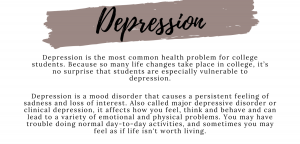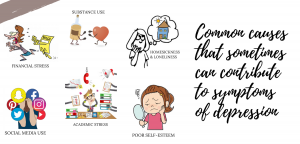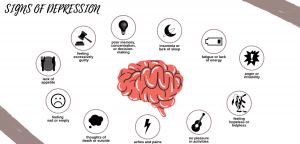Student Health & Counseling Center
Home » Resources » Student Health & Wellness » Mental Wellness » Depression
MenuMental Wellness
DEPRESSION
Tips to Managing Depression & Improving Mental Health:
- Get enough sleep: College students are notorious for pulling all-nighters, but doing this regularly takes a toll on your brain health and can ultimately exacerbate the symptoms of depression.
- Move your body: Exercise can help reduce symptoms of depression by releasing endorphins and providing a mental distraction that can help break the negative thought cycles that can feed into depression.
- Eat a healthy diet: Processed food high in sugar won’t provide your brain and body with the energy it needs to succeed in school. Not only will improving your diet improve your overall well-being, it’s also been shown to improve symptoms of depression.
- Avoid drugs and alcohol: Substances often intensify the symptoms of depression, especially when abused. And, as outlined above, they can lead to risky behaviors that can impact a student’s mental health.
- Practice mindfulness: A 2015 study by Oxford University found that mindfulness-based cognitive therapy in the treatment of ongoing depression can be just as effective as antidepressant drugs in helping prevent a relapse into the worst symptoms.
- Build a support system: Develop a group of people you can regularly check in with about how things are really going for you. This can help you manage stressful feelings or situations before they become anxiety- or depression-provoking.
Where to Get Help:
Student Health & Counseling Center
Students in crisis will be seen immediately and do not require an appointment. If you think you are (or a friend is) in crisis, please get to a safe place and call us: (503) 838-8313 or Campus Public Safety (503) 838-9000.
nonprofit working to reduce the number of suicides by college students and includes a hotline among its various resources. Students can Text “START” to 741-741 or call 1-800-273-TALK (8255) if they need immediately help with a mental health problem.
Mastering College Stress and Anxiety
guide to students who are experiencing symptoms of anxiety disorders or depression and need practical steps to restore their mental health.
National Suicide Prevention Lifeline
Students in extreme emotional distress can call 1-800-273-TALK 24/7 to receive support and guidance from trained professionals.
College students who are military veterans may be dealing with PTSD or other forms of anxiety and depression.
Anxiety and Depression Association of America
Connects students with a range of service providers and resources when seeking help to treat anxiety, depression, obsessive-compulsive disorder and post-traumatic stress disorder.
Substance Abuse and Mental Health Services Administration Hotline
This hotline is open from 8:00 a.m. to 8:00 p.m. EST every day and helps students find treatment services in their communities.




